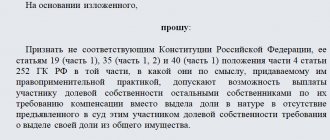3K 4 min.
The Constitutional Court (CC) has banned the detention of persons under investigation in psychiatric hospitals indefinitely. Courts, when transferring defendants in criminal cases from a pre-trial detention center at the request of investigators to a medical hospital, are required to clearly define the timing of this measure. It can be extended according to the same rules as a preventive measure within the framework of an investigation. The Constitutional Court proposed to the legislator to improve Art. 435 of the Criminal Procedure Code (CPC) of the Russian Federation, but did not oblige him to implement the recommendations. The Constitutional Court ordered the cases of the applicants forcibly in psychiatric hospitals to be reviewed.
Photo: Yuri Martyanov, Kommersant / buy photo
The resolution of the Constitutional Court should change the practice of applying Art. 435 of the Criminal Procedure Code of the Russian Federation, which allows for the indefinite placement of persons under investigation in a pre-trial detention center in a psychiatric hospital. According to the contested norm, the court “at the request of the investigator with the consent of the head of the investigative body, as well as the interrogating officer with the consent of the prosecutor” may, in the manner established for detention (Article 108 of the Code of Criminal Procedure of the Russian Federation), decide to transfer the prisoner to a psychiatric hospital.
Applicant D. from the Kursk region was detained in July 2021 under Art. 264 and art. 166 of the Criminal Code of the Russian Federation (on violating traffic rules and taking possession of someone else’s car without the purpose of theft) and was placed in a special medical institution less than two months before the end of the extension of his imprisonment in a pre-trial detention center (it expired on November 27, 2021). The preventive measure in the criminal case was canceled after he was transferred to a psychiatric hospital; as a result, the applicant was forced to spend more than a year in hospital. All this time he unsuccessfully complained to the courts, after which he turned from the hospital to the Constitutional Court.
The controversial norm of the Code of Criminal Procedure, according to the applicant, allows for the possibility of indefinite detention of accused persons in such institutions, which violates their constitutional rights.
How United Russia is ready to soften the conditions of detention in pre-trial detention centers
Applicant K., detained in Moscow in May 2021 under Art. 134 of the Criminal Code of the Russian Federation (sexual acts with a minor), the court, at the request of the investigator, sent him to the hospital “until recovery” on the day when the nine-month extension of his detention expired. The preventive measure was canceled, but the applicant was unable to be released. After six months of litigation, the court returned the case of compulsory treatment of the accused to the prosecutor due to “violations of criminal procedural legislation during the preliminary investigation,” but the applicant continued to remain in the hospital. He complained to the Constitutional Court that the controversial norm of the Code of Criminal Procedure “does not equate detention in a psychiatric hospital at the stage of preliminary investigation to preventive measures” and does not allow the courts to “determine its procedure and terms in relation to persons suffering from mental illnesses before considering the criminal case on the merits.”
The Constitutional Court recognized the regulatory defect, but did not cancel the norm, but only clarified the procedure for its application. The resolution states that transferring a person to a psychiatric hospital is a temporary compulsory measure, not identical to the imposition of compulsory measures of a medical nature, however, the legislation does not contain instructions on the length of stay in psychiatric hospitals of persons transferred there. Such a period cannot be indefinite and extended outside of judicial control, the Constitutional Court recognized. Courts are required to clearly establish the period for which a person is placed in a psychiatric hospital and the calendar date of its expiration. It can be extended only taking into account the provisions of the Criminal Procedure Code on the procedure for extending the period of detention with the participation of the defendant, his defense attorney and the prosecutor. If the person’s mental condition improves before the deadline established by the court, he must be discharged from the hospital. Moreover, if the period of detention of this person in a pre-trial detention center has expired, the court must decide on the measure of restraint within the framework of criminal prosecution.
Transfer to another cell
When transferring material assets through POC (TVs, refrigerators, etc.), the question often arises as to whether these material assets are “assigned” to a specific citizen. Since this question is often asked, it requires a separate explanation.
If you donate material value to the PSC, the PSC visits the premises that you indicated in the application and checks the conditions of detention there. If there is no TV (refrigerator, ...) in this room, then the PSC transfers the equipment to the institution and, according to the Agreement, this equipment is placed in this particular cell room.
The PMC has the right (as a donor) to control that this equipment is delivered to a specific premises and used for its intended purpose. BUT! The POC does not carry out transfers from cell to cell of persons held there.
The PSC only guarantees that the donated equipment will reach a specific camera!
At the same time, we clarify that “just like that” transfers are not possible in a pre-trial detention center. What should you do if you were handed over to a prisoner, but your relative was transferred to another cell?
1. To begin with, it is recommended to study the legislation, namely the internal regulations:
Transfer of suspects and accused from one cell to another is permitted in the following cases:
a) the need to ensure compliance with the requirements for separate placement of suspects and accused, provided for in Article 33 of the Federal Law, or when changing the plan for cell placement of suspects, accused and convicted persons;
b) the need to ensure the safety of life and health of the suspect, accused or convicted person or other suspects, accused or convicted persons;
c) the need to provide medical care to a suspect, accused or convicted person in a hospital setting;
d) the presence of reliable information about an impending crime or other offense.
The transfer is carried out with the written permission of the head of the pre-trial detention center or the person performing his duties.
A suspect, accused or convicted person, whose behavior gives reason to believe that he may cause harm to himself or other persons, is transferred to a cell for temporary isolation by written order of the head of the pre-trial detention center or the person performing his duties, and in their absence, the assistant on duty. The administration of the pre-trial detention center immediately calls an emergency medical team so that the emergency medical worker makes a decision on the advisability of hospitalization of the suspect, accused or convicted person.
The movement of suspects, accused and convicted persons from one cell to another during repair work in the cells, as well as during the elimination of accidents in water, electricity and sewerage systems is carried out with the written permission of the head of the pre-trial detention center or the person replacing him. If it is impossible to move all persons from one cell to another, the issue of placing each suspect, accused or convicted person in different cells is decided individually.
2. To explain in your own words, transfers can occur in the following cases:
The experience of the PSC in previous periods may indicate the following possible reasons:
Due to the “fault” of the detained citizen:
- Prohibited items were found in the cell, such as cell phones (and rarely does anyone admit that the phone is his, so the entire cell can be “disbanded” due to the violation of one)
— Fight (it also doesn’t matter who the “instigator”)
— Gross violations of the regime (no one is specifically finding fault, but no one will “tolerate” systemic violations).
Changed circumstances
- the “status” of the cellmate has changed and further joint detention is illegal (the most common is that the sentence has entered into force)
— medical assistance is required (transfer to the medical unit)
- long-term absence of a cellmate (for example, transfer to a temporary detention facility for 10 days, and there are only 2 people in the cell. Solitary confinement is not allowed)
Operational Considerations
— information about a threat to life
— a citizen contacted the administration with a statement that he was being threatened
- other destructive behavior options (attempt to organize a riot, etc.)
Options for when they can still “translate” will be expanded with experience.
3. Does transfer always mean worsening conditions?
When transferred from cell to cell, employees think less about whether the new cell will have a refrigerator and a TV. It is quite possible that the conditions in the new cell will be even better. At least no one deliberately worsens the conditions of detention in this way.
4. What to do if you are transferred?
The POC always asks to donate more equipment (not just one set at a time) so that in such cases it is possible to quickly put the equipment in the cell, especially if the transfer is not associated with any violations on the part of the prisoners. But lately, donors, as a rule, give only one set of equipment, so there are practically no “spare” sets.
You can always draw the attention of the PSC to such transfers and we will try to check the legality and somehow resolve the situation. It makes no sense to complain if there were gross violations on the part of the person being held (cell phone, fights, ...), since such a transfer will be recognized as legal and justified.
If you believe that the translation was not legal and justified, then you can also complain about your choice:
— Head of the pre-trial detention center
— Head of the Federal Penitentiary Service for St. Petersburg and Leningrad Region Potapenko Igor Vasilyevich
— Human Rights Assistant Elena Valerievna Kuznetsova
- To the Prosecutor's Office
— Commissioner for Human Rights
to any other authority at your discretion.
The ECHR intends to adjust the rules for transporting convicted and pre-trial prisoners in Russia
The Constitutional Court recalled its previous positions: the legislator “is obliged to establish a clear and reasonable time frame for permitted restrictions on rights and freedoms” and “restriction of a person’s freedom due to the nature and duration of a mental disorder and the resulting need to provide him with psychiatric care in a medical organization, including without it.” consent must be reasonable and proportionate.” Such a person must be provided with all procedural guarantees against violations of the right to liberty and security of person, including “such an important guarantee against abuse in this area as judicial review of all cases of involuntary placement in a psychiatric hospital on the basis of medical data.” The presence of a person in a pre-trial detention center at the time of his placement in a hospital does not cancel these guarantees, the Constitutional Court emphasized. The transfer of a prisoner from a pre-trial detention center to a hospital must “be ensured by procedural guarantees and judicial control,” including on the basis of “both the continuation of the provision of psychiatric care to this person, and further criminal proceedings with his participation (in person or through a defense lawyer and legal representative), the court ruling says.
The Constitutional Court only recommended that the legislator “clarify the mechanism and conditions for placing persons” who are in custody in a medical organization that provides psychiatric care in inpatient conditions,” including the procedure and grounds for extending the period of their stay in such a hospital, restrictive requirements for the regime of detention , as well as the rights of persons placed there, their defenders and legal representatives. The Constitutional Court did not oblige the legislator to implement these recommendations, setting them out in the motivational and not the operative part of the decision.
“Arbitrary deprivation of liberty is a large-scale and systemic problem, there are many such cases as in this case,” lawyer Dmitry Bartenev from the Onegin law office (specializing in medical activities) told Kommersant. The Constitutional Court, according to him, consistently corrects the practice of fundamental violations of human rights. But the legislator, introducing amendments after this, often changes the controversial norms contrary to the legal positions of the Constitutional Court, essentially perpetuating the continuation of violations of the Constitution, the lawyer says. “It is important that the changes comply not only with the letter, but also with the spirit of the decisions of the Constitutional Court,” he believes.
Anna Pushkarskaya, St. Petersburg
The procedure for transferring convicts from one correctional institution to another
The grounds for transferring convicts from one correctional institution to another are determined by the Criminal Executive Code of the Russian Federation (PEC RF). Thus, in accordance with the requirements of Article 81 of the Penal Code of the Russian Federation, those sentenced to imprisonment must serve the entire sentence, as a rule, in one correctional facility. The principle of serving the entire term of a sentence by those sentenced to imprisonment in one correctional institution is essential from the point of view of achieving the goals of punishment. During the period of stay in a correctional institution, the convict gets used to the level of requirements, masters a working specialty, and can continue vocational and general education. The administration studies the personality of the convicted person, his social connections outside the place of imprisonment, and implements measures to facilitate his social adaptation after release from the correctional institution. Transferring a convicted person to another correctional institution of the same type interrupts this process and forces it to start again. This situation leads to significant losses of a psychological, pedagogical, material, financial and organizational nature.
The transfer of a convicted person to further serve his sentence from one colony to another of the same type is an exception to the general rules and is permitted:
1. In case of illness of a convicted person (transfer for inpatient treatment and specialized medical care to medical institutions of the penal system, located, as a rule, in a different climatic zone).
2. To ensure the personal safety of convicts (in the event of a real threat to the life of the convict emanating from other convicts).
3. During the reorganization or liquidation of the correctional institution in which the convicted person is serving his sentence.
4. In other exceptional circumstances that prevent the convict from continuing to stay in this correctional facility (natural disasters, man-made disasters, mass riots, group disobedience of convicts to the administration of the institution, epidemics).
It should be taken into account that circumstances such as the difficult financial situation of relatives, the serious health condition of relatives and friends, as well as other social, everyday and family problems of convicts are not “exceptional circumstances” and cannot be considered as a basis for transferring a convict to another correctional institution.
The procedure for transferring convicts to further serve their sentence from one correctional institution to another of the same type is determined by the Ministry of Justice of the Russian Federation. The initiative for transfer may come from the convict himself, the administration of the correctional institution, the prosecutor overseeing the legality of the execution of the sentence, a deputy, the Commissioner for Human Rights in the Russian Federation, or relatives of the convict. If the initiators of the transfer are relatives of the convicted person, deputies or the Commissioner for Human Rights in the Russian Federation, the transfer can only be carried out with the written consent of the convicted person.
Each time a request for transfer is made, its validity is checked, after which authorized employees of the territorial body of the penal system draw up the necessary package of documents with conclusions about the feasibility (inexpediency) of transferring the convicted person. The transfer of a convicted person to a correctional institution located within one subject of the Russian Federation (for example, within the Murmansk region) is carried out on the instructions of the head of the territorial management body of the penal system (for example, the head of the Federal Penitentiary Service of Russia for the Murmansk region). The transfer of a convicted person to a correctional institution located in another subject of the Russian Federation (for example, outside the Murmansk region) is carried out at the direction of the leadership of the Federal Penitentiary Service of Russia (Moscow) on the basis of a reasoned conclusion.








